Support strong Canadian climate journalism for 2025
I received numerous requests from readers to expand my last article on emissions in Sweden and BC to also include the other provinces where Greta led climate strikes -- Quebec and Alberta. Here it is.
"My name is Greta Thunberg. I am sixteen years old. I come from Sweden. And I speak on behalf of future generations." – speech to U.K. House of Parliament, London, 23 April 2019
Swedish climate striker, Greta Thunberg, travelled a long, slow, low-carbon way across Canada to bring her message of urgency to climate strikes in Montreal, Edmonton and Vancouver.
In the spirit of cultural exchange, I decided to learn what I could about Sweden's own climate emissions and efforts. So, if you, too, are interested in how our northern jurisdictions compare on climate pollution, you're in luck. I waded through a fat pile of reports and spreadsheets to put together five charts, and the stories behind them, to compare the climate pollution from Sweden with that from Quebec, Alberta and B.C..
Pollution Down. Pollution Up
Let's start with annual emissions.
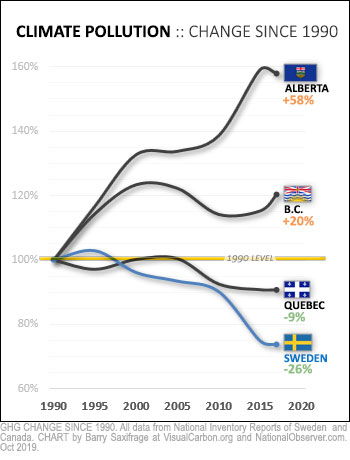
For decades, both Sweden and Canada have been promising to reduce emissions. My first chart lets you see what's happened.
The Swedes have slashed their emissions by a quarter.
Quebec has also lowered theirs, about one third as much.
B.C., meanwhile, has pumped up climate pollution by 20 per cent.
And Alberta? Their pollution is rising at a dizzying pace – up 58 per cent.
Canada, as a nation, pledged to reduce emissions back to our 1990 levels by 2020. As of 2017, we were polluting nearly 20 per cent above that target. That means Canada as a whole is roughly where B.C. is on the chart.
Sweden's efforts show that it is clearly possible for wealthy northerners to achieve the kinds of pollution reductions we promised – and a whole lot more. Heck, the U.K. has managed to pull off a 41 per cent reduction since 1990.
Greta: "A lot of people say that Sweden is a small country, that it doesn’t matter what we do. But I think that if a few girls can get headlines all over the world just by not going to school for a few weeks, imagine what we could do together if we wanted to. Every single person counts. Just like every single emission counts. Every single kilo. Everything counts. So please, treat the climate crisis like the acute crisis it is and give us a future. Our lives are in your hands." – speech at Stockholm Climate March on 8 September 2018
Person by person
Greta: "The bigger your carbon footprint, the bigger your moral duty." – speech to the World Economic Forum, Davos, 25 January 2019
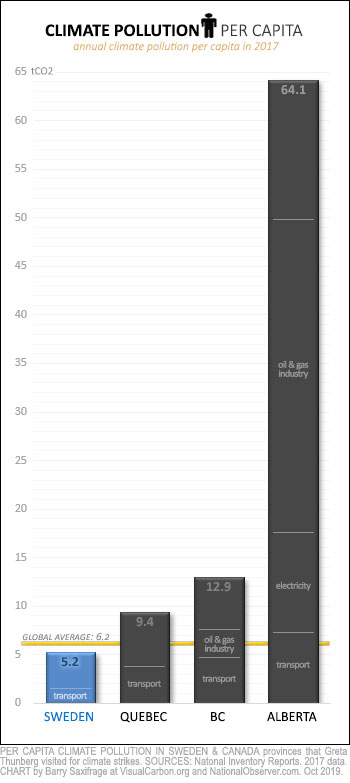
Next, let's look at the amount of climate pollution emitted per person.
As my second chart shows, the average Swede emits a little over five tonnes of climate pollution (tCO2) each year.
That's one tonne less than the global average.
The average Québécois, emits nearly twice as much – 9.4 tCO2 each.
British Columbians pollute even more. They emit 12.9 tCO2 each. That's more than double the global average.
And Albertans emit ten times the global average – 64 tCO2 each.
Why are the Swedes so much less polluting? To look for clues I dug deeper to find the emissions that each sector of the economy causes.
Two things jump out for me.
First, is the climate pollution from transportation. It is, by far, the largest part of the carbon footprint in Sweden, Quebec and B.C.
And, as you can see on the chart, transportation pollution alone per person in both B.C. and Alberta exceeds the entire Swedes carbon footprint for everything.
We'll take a look two of the biggest transportation problems – driving and flying – below.
The second thing that jumps out at me is the huge emissions from the oil and gas industry in both B.C. and Alberta. In B.C., this one industry emits 2.6 tCO2 per person. That's half Sweden’s entire total. And in Alberta, the oil and gas industry emits 32 tCO2 per person.
And now, the oil and gas industry is poised to double its climate pollution in B.C. if they build just two of their currently planned LNG projects – LNG Canada and Kitimat LNG. While in Alberta, the oil and gas industry plans to continue its relentless expansion of bitumen extraction.
Those two examples, just scratch the surface of what we could learn from studying the emissions of Sweden and most other European nations. If you want to explore more, the official greenhouse gas (GHG) inventory for Sweden, and for most other major nations, are here. And like Greta's speeches, Sweden's report is, very helpfully, in English.
Each kilometer driven
As we saw above, transportation is one of the biggest climate pollution differentiators between our regions. So, I decided to look into the biggest component of the sector: cars.
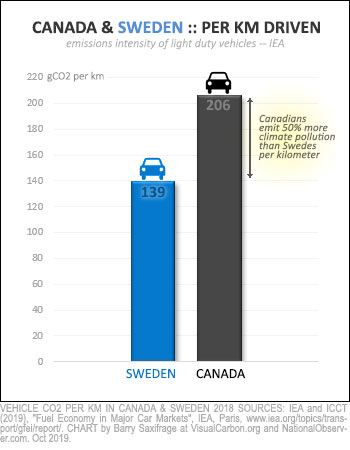
My third chart shows the amount of climate pollution emitted per kilometre for the average passenger vehicle. This data comes from a recent report by the International Energy Agency.
The blue bar shows that Swedish cars average 139 grams of CO2. This is similar to cars in the U.K. and many other European countries.
At this rate, a car travels 7,200 kilometers for each tonne of CO2 it emits.
I couldn't find data specific to cars in each province, so I've used the Canadian average from that same IEA study. What it shows is that Canadians currently drive the world's dirtiest passenger vehicles.
On average, our cars emit 206 grams of CO2 per kilometer. That's 50 per cent more pollution for every kilometer than in Sweden. Our cars take us only 4,850 kilometers for each tonne of CO2 that gets dumped out the tailpipe.
What can Canadians do who want to clean up this mess? Stop buying new vehicles that burn fossil fuels. The average new fossil-fuelled car in Canada will emit 66 tCO2 from burning gasoline. If you really need a new vehicle, buy an electric one. They are the only option that align with future climate targets. As a climate bonus, 80 per cent of Canadians have nearly zero-carbon electricity to power them with.
"Flyskam"
There is one area in which Swedes pollute far more than the global average -- burning jet fuel. As my next chart shows, Sweden's per capita CO2 from flying is roughly three times the global average.
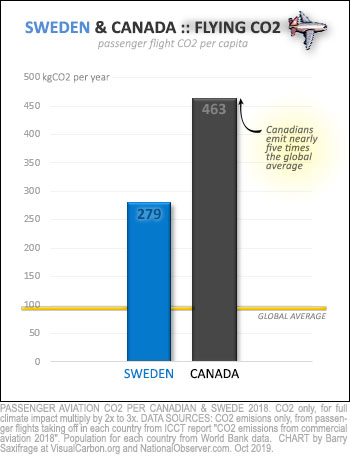
This level is so high that the Swedish have a word for how many of them are starting to feel about it: "flyskam."
This translates roughly to "ashamed of flying." There is a growing movement in Sweden, and elsewhere, of people who feel conscience-stricken and are cutting back or giving up fossil-fuelled flying completely.
The industry and many media stories I have read are incorrectly presenting this concept as an effort to "shame others for flying."
Greta may be the world's most famous airplane refusenik.
Before she started her public climate strikes, she started at home asking her family to lower their carbon footprint by giving up flying and eating meat. Over two years they did both, even though her mother, an opera singer, had to give up her international career as a result. Greta says her parents' agreement to work for a low-carbon life gave her hope that she could make a difference in the fight for a safe climate future.
Greta: “I’ve decided to stop flying because I want to practice as I preach, to create opinion and to lower my own emissions. One person who stops flying will not make a difference. But if a large number of people do then it will. It sends a message that we are in a crisis and have to change our behaviour.” – interview with HuffPost
Sidenote: If you want to learn more about the climate impacts from different transportation options, here's an infographic and article I put together on the topic.
‘Our new currency’: GDP vs GHGs
My final climate chart covers a subject that I think is critical to our economic future, but that gets little attention in Canada. It's the carbon-intensity of the economy. And it is usually measured in climate pollution per dollar of GDP.
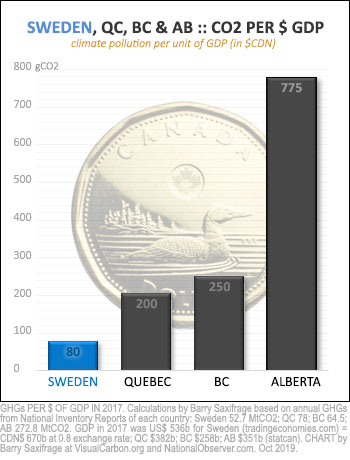
I couldn't find a direct comparison between Sweden and individual provinces on this, so I did my own rough calculations.
In 2017, Sweden's GDP was around $670 billion in Canadian dollars. For comparison, provincial GDPs in that year were:
- $258 billion in B.C.
- $351 billion in Alberta
- $382 billion in Quebec
Dividing each region's climate pollution by their GDP results in the chart on the right. It shows the grams of CO2 (gCO2) emitted per Canadian dollar of GDP.
As you can see, the Swedish economy is much cleaner. It emits just 80 gCO2 for each dollar of GDP.
Quebec and B.C. have to emit roughly three times more climate pollution to produce each dollar. And Alberta currently emits ten times more climate pollution than Sweden does per dollar of GDP.
As CO2 becomes more expensive to emit, economies that create the most value from each tonne will have an economic advantage.
Greta: "We should no longer measure our wealth and success in the graph that shows economic growth, but in the curve that shows the emissions of greenhouse gases. We should no longer only ask: ‘Have we got enough money to go through with this?’ but also: ‘Have we got enough of the carbon budget to spare to go through with this?’ That should and must become the centre of our new currency." – speech to U.K. House of Parliament, London, 23 April 2019



Comments
Thanks for this thorough investigation. Your work is appreciated.
Nice work and well done Barry! As an Albertan, a vegan and an advocate of individuals taking responsibility for climate change I know it is helpful for everyone to understand where to focus their efforts. I don’t believe Alberta or Canada can or should flush our resource-driven economy down the drain (i.e. throw the baby out with the bath water ) but this type of data can help individuals to manage their own carbon footprint. P.S. I do appreciate Greta more as a result of your background information.
I've been vegetarian for 50 years, and vegan for well over half that, don't drive, keep my yard organically planted and compost almost all the waste the household produces. I've reduced, reused and recycled assiduously as long as I've been vegetarian, and don't use noxious chemicals in my house or yard. I travel very little. Yet the difference in my carbon footprint compared to that of neighbours who do none of the above is tiny in comparison to what needs to be accomplished on a per capita basis. There is a limit to how much impact an individual can have on provincial or federal emissions numbers, since most emissions directly ascribable to individuals form a very small proportion of the total.
The big numbers are driven mainly by gas and oil extraction, and by gas- and oil-powered transport: personal, commercial and industrial.
Perhaps if one considered one's form of employment to be attributable to one's "share," one could reasonably focus on "individuals' responsibility."
I don't think anyone in Canada wants Alberta to suffer drastic personal economic setback, and many of us subscribe to a Green New Deal in significant part because it looks for a fair transition.
Fair, to me, means that every region/province take up no more than its "fair share" of the national carbon budget, and on the way to that, in significant measure by 2030, gets help with businesses/employment producing clean energy. Good, clean jobs, that don't leave a dead ecology, sick animals and people downstream, and workers exposed daily to toxic substances. The oilfields have always produced toxic substances: think "sourgas" stinking water back even in the late 50s and early 60s.
People argue that resources shouldn't be left in the ground. Why not? Their extraction and use is killing the entire planet!!! Besides: oil and gas don't form overnight. Perhaps there'll be a day far in the future when they are really needed by the people of the future. What moral or Christian rationale can there be for robbing the future by using up everything today? Haven't we done enough of that by despoiling the oceans, cutting down the forests, killing off the wildlife and screwing up the climate systems that kept us more or less in a balanced environment?
Why shouldn't everyone give their fair share to the national and global effort, and take only their fair share? It's not basically a question of economics, it's a question of survival.
My great-grandparents, grandparents and parents (and indeed many relatives on both sides of the family are Albertans. Some are directly or indirectly employed in fuel extraction industries.
Most of them, like most Albertans I've met, are decent, hard-working people, generous with their families and neighbours, and as smart as Canadians anywhere. Our people, too, are a resource. Maintaining big profits for a few wealthy individuals isn't worth flushing them, along with the rest of Canadians and our fellow global citizens, down the toilet.
The petroleum industry has known for approximately half a century the effect it's been having on climate. They didn't care about anyone else then, and they don't now.
They have pipe-dreams in their heads about going to live on Mars when it gets too rough down here. Say wot.
Unfortunately, a lot of people get their news, statistics and rationales only from the energy industries' representatives: FaceBook is not a grand source of fact and truth; most people aren't wittingly passing on propaganda, but that's what CAPP provides. I know: we've had their ads on local TV here, rife with misrepresentations, untruths and outright lies.
We all need to listen to the hesitations and fears of the people dependent for their livelihoods on resource extraction industries, and find ways to quickly transfer their dependence to clean energy production industries. And if the likes of the owners of Big Oil need to take home less than multiple millions of dollars in profits every year, and perhaps even give up some of their billions and billions in accumulated wealth, then that's a sacrifice I think we're all justified in demanding they make.
Because we all deserve to live out our normal lifespans, and that includes the wee ones just born and those not yet born.
Mine's closer to its end than its beginning, but I, like each person "living off" the oilpatch, still need to do what I can so that future generations have not only a chance at a better life than mine (as my forebears did), and generally to follow the Golden Rule.
Last I heard, the fuel extraction industries made up at best less than 2% of Canada's economy.
The harvest of potatoes in PEI is not equivalent to the harvest of oil in Alberta.
Thanks for thoughtful comments. The following is a point of interest.
The way we feed ourselves (vegans included) is a bigger part of the picture than people realize. Almost all food on supermarket shelves uses 10 calories of fossil fuels per calorie of food. Many, maybe most, of those fossil fuels are used in producing the synthetic fertilizers touted in Green Revolution agriculture. Because the IPCC uses the NAICS to classify industries, that piece of emissions is in the energy industry as opposed to the agriculture industry.
However, unlike most industries, how we feed ourselves can become a net sink of carbon (versus just reducing emissions) if we rebuild the fertility of our soils. In conflict with the current zeitgeist, a) this requires best management practices of ruminants, i.e. livestock, and b) it is a more labour-intensive approach so that meat will cost a lot more (but if the price of pollution was included in prices today it should be cheaper than that).
Yeah. 20 years ago, I operated a vegan cooking service, geared to people with special diet needs. I sourced organic ingredients, as possible, and always chose domestic produce, local where possible, over internationally produced.
It wasn't perfect, but probably considerably better than the 10% average caloric input of supermarket groceries, generally, which, it must be noted, are largely meat, sugar and factory-farm grain: with a lot of industrial processing of ingredients. It is very difficult to find a supermarket product, other than fruits & veg, with no highly processed ingredients on the label, and many aren't required to be named on labels. OTOH, meat comes with zero labels.
Interesting and pertinent factual comparisons, but only a small snapshot of a part of the whole picture of us human's impact on the Biosphere of this planet. We also have to look at how we are not putting that carbon back into the Biosphere in a form that it can store safely and recycle to sustain the life engine of organisms including us that makes life on this planet possible. We still have a chance to fix that recycling part of the equation as well. Surely it is a noble and exciting challenge to bring our destructive impact on the Biosphere to an end now. That will leave a legacy for survival options for our children's children. The way we are crippling the Biosphere now leads to extinction. My take on the evidence I have been able to glean from the published evidence thus far!
I love your factual reporting. Of course, facts may not paint a complete picture, but it is the foundation, the starting point of our understanding. Need data. Good work.
Saying we're doing well cutting emissions, except for Alberta and Saskatchewan, is like saying I smoke a pack of cigarettes every day but otherwise lead a healthy lifestyle. It's time to quit smoking.